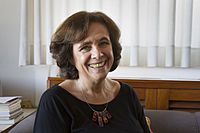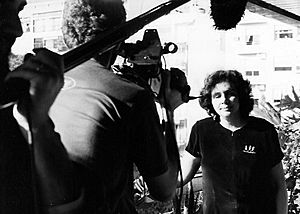Ana María Shua facts for kids
Quick facts for kids
Ana María Shua
|
|
|---|---|
 |
|
| Born | Ana María Schoua April 22, 1951 Buenos Aires, Argentina |
| Occupation | Writer, illustrator |
| Alma mater | University of Buenos Aires |
| Genre | Fiction |
| Notable awards | Guggenheim Fellowship |
| Spouse | Silvio Fabrykant |
| Children | Gabriela Fabrykant Paloma Fabrykant Vera Fabrykant |
Ana María Shua, born on April 22, 1951, is a famous writer from Argentina. She is especially known for writing very short stories called microfiction.
Shua has published more than eighty books. These include novels, short stories, microfiction, and poetry. She has also written plays, books for children, and funny stories. She has even written about Jewish folklore and created scripts for films.
She has won many awards both in Argentina and around the world. One of her big awards is a Guggenheim Fellowship. Many people call her the "Queen of the Micro-Story" in the world of Spanish writing.
| Top - 0-9 A B C D E F G H I J K L M N O P Q R S T U V W X Y Z |
Ana María Shua's Writing Journey
Early Life and Learning
Ana María Shua was born in Buenos Aires in 1951. Her original family name was Schoua. She loved writing from a young age. Books like Black Beauty inspired her.
When she was just sixteen, she published her first poetry book, El sol y yo. This was in 1967. She won a prize that helped pay for 1,000 copies of her book. This collection also won an award from the Argentine Society of Writers.
Shua later studied at the University of Buenos Aires. She earned a degree in education, focusing on literature.
Living Away from Home
During a difficult time in Argentina, Ana María Shua moved to France. This was from 1976 to 1977. Many other writers and thinkers also left Argentina then. Her sister and two cousins also went into exile. While in Paris, she worked for a Spanish magazine.
Returning Home and Finding Success
After returning to Argentina, Shua published her first novel, Soy paciente, in 1980. This book won an award. People often saw it as a story about the military government that was in power at the time.
The next year, she published her first collection of short stories, Los días de pesca. In 1984, her novel Los amores de Laurita became very popular.
That same year, she published La sueñera. This was her first collection of microfiction. These are extremely short stories that became her special style. Shua had worked on La sueñera for ten years before it was published.
Since then, she has published more microfiction collections. These include Casa de Geishas, Botánica del caos, and Temporada de fantasmas. She also released Cazadores de letras, which combines her first four microfiction books. Her latest collection is Fenómenos de circo.
Shua loves writing microfiction because "every word is essential." She says that the rhythm and sound are just as important as the meaning. She also feels that these super-short stories make authors "work with the knowledge of the reader."
In 1994, she received a Guggenheim Fellowship. This helped her write her novel El libro de los recuerdos. This book tells the story of a Jewish family in Argentina. It is partly based on her own family's history.
Shua has also worked as a journalist and a writer for advertisements. She has written screenplays for movies. Some of her own writings, like Los amores de Laurita, were made into films. She also helped write the script for the movie Where Are You My Love, That I Cannot Find You?.
She has written many books for children. She also writes humorous works and stories about folklore. One of these is El pueblo de los tontos. This was the first Spanish version of traditional Chełm stories.
In 2009, a full collection of her stories was published as Que tengas una vida interesante. Some of her stories were translated into English that same year in a book called Microfictions. Other English translations include The Book of Memories, Quick Fix, and Circus Freaks.
Awards and Special Recognition
Ana María Shua has received many honors. These include two awards for El sol y yo and an award for Soy paciente. She also received the Guggenheim Fellowship.
Her children's book La fábrica del terror won awards from the Banco del Libro and the International Board on Books for Young People. Her book Fenómenos de circo won first place in the stories category from the Argentine Ministry of Culture.
Her 1997 novel La muerte como efecto secundario was named one of the 100 best Spanish novels of the last 25 years. This was by the International Congress of the Spanish Language.
In 2016, Shua received the first Juan José Arreola Ibero-American Prize for Mini-Fiction.
About Ana María Shua's Life
Ana María Shua's parents were Jewish. They came from Poland and Lebanon. Her father was an atheist, so she grew up mostly without religion. However, Shua has said that being Jewish is "not something that you choose." Jewish themes sometimes appear in her writing.
As a fiction writer, Shua prefers not to read non-fiction. This includes reviews or criticisms of her own work.
She is married to Silvio Fabrykant, who is an architect and photographer. They got married in 1975. They have three children: Gabriela, Vera, and Paloma Fabrykant.
Ana María Shua's Books
Novels
- Soy paciente (1980)
- Los amores de Laurita (1984)
- El libro de los recuerdos (1994)
- La muerte como efecto secundario (1997)
- El peso de la tentación (2007)
- Nemo (2003)
Short Story Collections
- Los días de pesca (1981)
- Viajando se conoce gente (1988)
- Como una buena madre (2001)
- Historias verdaderas (2004)
Microfiction Collections
- La sueñera (1984)
- Casa de geishas (1992)
- Botánica del caos (2000)
- Temporada de fantasmas (2004)
- Quick fix (2008)
- Cazadores de Letras (2009)
- Microfictions (2009)
- Fenómenos de circo (2011)
Children's Books
- La batalla de los elefantes y los cocodrilos (1988)
- La fábrica del terror (1991)
- La puerta para salir del mundo (1992)
- Cuentos judíos con fantasmas y demonios (1994)
- Ani salva a la perra Laika (1996)
- Historia de un cuento (1998)
- Cuentos con magia (1999)
- La luz mala (2000)
- Los monstruos del Riachuelo (2001)
- Planeta miedo (2002)
- Su primera zanahoria (2005)
- Un ciervo muy famoso (2005)
Humorous Fiction
- El marido argentino promedio (1991)
- Risas y emociones en la cocina judía (2003)
Poetry Collections
- El sol y yo (1967)
Movie Scripts
- Soy paciente (1986)
- Los amores de Laurita (1986)
- ¿Dónde estás amor de mi vida que no te puedo encontrar? (1992)
Documentary
- En el nombre del padre. Contrakultura Films, 2002. Produced by Eduardo Montes-Bradley
See also
 In Spanish: Ana María Shua para niños
In Spanish: Ana María Shua para niños
 | Isaac Myers |
 | D. Hamilton Jackson |
 | A. Philip Randolph |


